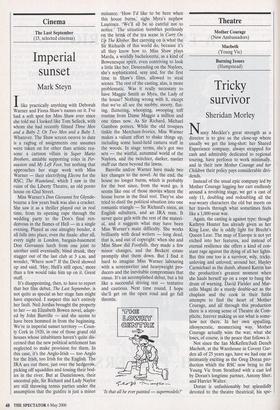Cinema
Imperial sunset
Mark Steyn
Ilike practically anything with Deborah Warner and Fiona Shaw's names on it. I've had a soft spot for Miss Shaw ever since she told me I looked like Tom Selleck, with whom she had recently filmed Three Men and a Baby 2. Or Two Men and a Baby 3. Whatever. The Shaw screen oeuvre to date is a ragbag of assignments one assumes were taken on for other than artistic rea- sons: a cartoon villain in Super Mario Brothers, amiable supporting roles in Per- suasion and My Left Foot, but nothing that approaches her stage work with Miss Warner — their electrifying Electra for the RSC; The Wasteland, which I saw in the ruins of the Liberty Theatre, an old porno house on 42nd Street.
Miss Warner's Don Giovanni for Glynde- bourne a few years back was also a cracker. She saw it as a thriller played out in real time, from its opening rape through the wedding party to the Don's final ren- dezvous in the flames of Hell — in a single evening. Played as one almighty bender, it all falls into place, even the finale: after all, every night in London, bargain-basement Don Giovannis lurch from one joint to another until eventually, blind drunk, they stagger out of the last club at 3 a.m. and wonder, 'Where now?' If the Devil showed up and said, 'Hey, Hell's still open,' more than a few would take him up on it. Great stuff.
It's disappointing, then, to have to report that her film debut, The Last September, is not quite as special as her stage fans might have expected. I suspect this isn't entirely her fault. Neil Jordan brought the property to her — an Elizabeth Bowen novel, adapt- ed by John Banville — and she seems to have been hemmed in from the beginning. We're in imperial sunset territory — Coun- ty Cork in 1920, in one of those grand old. houses whose inhabitants haven't quite dis- cerned that the new political settlement has neglected to make provision for them. In this case, it's the Anglo-Irish — too Anglo for the Irish, too Irish for the English. The IRA are out there, just over the hedgerow, picking off squaddies and tossing their bod- ies in the river. But at Danielstown, their ancestral pile, Sir Richard and Lady Naylor are still throwing tennis parties under the assumption that the gunfire is just a minor nuisance. 'How I'd like to be here when this house burns,' sighs Myra's nephew Laurence. 'We'll all be so careful not to notice.' The situation trembles perilously on the brink of the tea scene in Carry On Up The Khyber. But carrying on is what the Sir Richards of this world do, because it's all they know how to. Miss Shaw plays Marda, a worldly bachelorette, as a kind of Bowenesque spirit, even contriving to look a little like her. Descending on the Naylors, she's sophisticated, sexy and, for the first time in Shaw's films, allowed to steal scenes. The rest of the casting, alas, is more problematic. Was it really necessary to have Maggie Smith as Myra, the Lady of the house? Nothing wrong with it, except that we've all see the snobby, snooty, flut- ing, fluttering, whooping, swooping toff routine from Dame Maggie a million and one times now. As Sir Richard, Michael Gambon potters. While the old troupers tinkle the Merchant-Ivories, Miss Warner makes a valiant effort to shake things up, including some hand-held camera stuff in the woods. In stage terms, she's got two sets — the wistful, autumnal world of the Naylors, and the twitchier, darker, nastier stuff out there beyond the lawns.
Banville and/or Warner have made two key changes to the novel. At the end, the house no longer burns, which is probably for the best since, from the word go, it seems like one of those movies where the house burns in the final reel. They've also tried to distil the political situation into one romantic triangle — Sir Richard's niece, an English subaltern, and an IRA man. It never quite gels with the rest of the materi- al, and it suggests what may have been Miss Warner's main difficulty. She works brilliantly with dead writers — long dead, that is, and out of copyright: when she and Miss Shaw did Footfalls, they made a few minor changes, and the Beckett estate promptly shut them down. But I find it hard to imagine Miss Warner labouring with a screenwriter and heavyweight pro- ducers and the inevitable compromises that ensue. It's an accomplished debut, but a bit like a successful driving test — tentative and cautious. Next time round, I hope she'll get on the open road and go full throttle.
`Is that all he ever painted — supermodels?'


































































 Previous page
Previous page